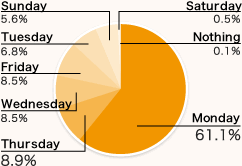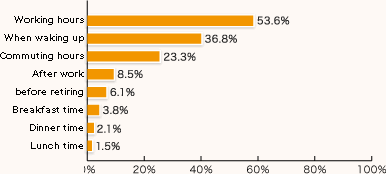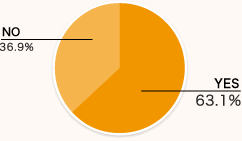JNKA conducted a survey on attitude towards stress with businesspeople
- It is Monday when people feel most stressed out -
Having Thrombus Prevention Month (20th Jan – 19 Feb, 2011), we, Japan NattoKinase Association conducted a research on the actual situation of stress which is one of the causes of thrombosis. A total of 800 Japanese men and women in their 20s to 50s throughout the country were surveyed. (The details are given below.)
and when waking up
It has been found out that the most of the participants (98.1%) are feeling some sort of stress in everyday situation from this survey. Also Monday is the day people feel most stressed by far compared to other days of the week (61.1%). Focusing on the time of the day, the largest number of participants answered “during working hours”, and “when waking up” was in the second place (36.3%). In addition, the result shows that 63.1% of the participants feel gloomy thinking about the next day on Sunday night.
Stress contributes to thrombus generation and thrombus is a cause of brain infarction and heart infarction. Looking at the causes of death for Japanese people, these cerebral vessel disease and cardiac disease follows cancer. Adding those 2 together, the ratio is even more than that of cancer.
According to the research (*1) presented by Department of Cardiovascular Medicine Osaka University Graduate School of Medicine (OACIS), which posses the world’s leading database about myocardial infarction and is the authority of myocardial infarction research, the incidence of myocardial infarction among employees is large on Monday, and especially with males the rate of crisis is 30% higher on Monday compared to other days of the week.
Now regarding the result of our survey as well, it can be said that there is a high risk for thrombosis on Monday morning especially in this cold season, and it is an asymptomatic disease; so extra attention should be paid.
*1 Kinjo K, et al.; Osaka Acute Coronary Insufficiency Study (OACIS) Group. Variation during the week in the incidence of acute myocardial infarction: increased risk for Japanese women on Saturdays. Heart. 2003; 89: 398-403.
“Most of the businesspeople are feeling stressed in everyday situations!”
Q. Do you feel any stress in daily situations?
 - 98.1% of the survey participants answered yes for this question.
- 98.1% of the survey participants answered yes for this question.
“Stressful Monday!? People feel most stressed on Monday during the week.”
Q. Which day of the week do you feel most stressed?
 - 61.1% of the participants answered Monday. Considering the percentages of the people who answered the other days of the week (all less than 10%), it can be said that Monday is by far the most stressful day.
The main reasons given by the participants who answered Monday included that they feel it is both mentally and physically difficult to get back to work, there is a morning assembly with all the workers every Monday, and the meeting is longer on Monday morning.
- 61.1% of the participants answered Monday. Considering the percentages of the people who answered the other days of the week (all less than 10%), it can be said that Monday is by far the most stressful day.
The main reasons given by the participants who answered Monday included that they feel it is both mentally and physically difficult to get back to work, there is a morning assembly with all the workers every Monday, and the meeting is longer on Monday morning.
“Stressful society has been revealed!? People feel stressed the most during working hours!”
Q. What time do you feel stressed most frequently in a day?
- 53.6% of the participants answered “during working hours” and 36.8% answered “when waking up”. It can be said that many people are feeling stressed from the work and the relationships in the workplace as well as from going to work in the morning.

“Approximately 60% of people are feeling gloomy at the end of the weekend”
Q. Do you feel gloomy thinking about the next day when watching TV on Sunday night?
 - 63.1% of the participants answered yes. It has been revealed that there are many people get stressed on Sunday night by thinking that another week will start again.
- 63.1% of the participants answered yes. It has been revealed that there are many people get stressed on Sunday night by thinking that another week will start again.
【Survey Overview】
■Area: Throughout Japan
■Method: WEB quantitative research using the Internet panel
■Period: 18 – 19 Dec, 2010
■Age of samples: 20s – 50s
■Gender of samples: Male and female
■Number of samples: 800 in total (100 each gender and generation)
■Features of samples: Employees working on weekdays (Sat & Sun off)
When citing the data here, clearly stipulate researched by Japan NattoKinase Association.
■Contact information for inquiries
JNKA Secretariat pr@j-nattokinase.org

